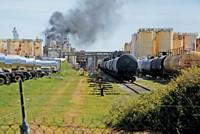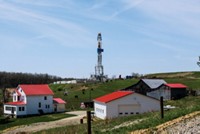Advertisement
Grab your lab coat. Let's get started
Welcome!
Welcome!
Create an account below to get 6 C&EN articles per month, receive newsletters and more - all free.
It seems this is your first time logging in online. Please enter the following information to continue.
As an ACS member you automatically get access to this site. All we need is few more details to create your reading experience.
Not you? Sign in with a different account.
Not you? Sign in with a different account.
ERROR 1
ERROR 1
ERROR 2
ERROR 2
ERROR 2
ERROR 2
ERROR 2
Password and Confirm password must match.
If you have an ACS member number, please enter it here so we can link this account to your membership. (optional)
ERROR 2
ACS values your privacy. By submitting your information, you are gaining access to C&EN and subscribing to our weekly newsletter. We use the information you provide to make your reading experience better, and we will never sell your data to third party members.
Environment
Fracking can affect water supplies, EPA says
by Jessica Morrison
December 19, 2016
| A version of this story appeared in
Volume 94, Issue 49
The Environmental Protection Agency last week finalized its long-awaited report on the impacts of hydraulic fracturing on drinking water supplies. The oil and gas extraction technique can impact drinking water resources, and the practice has affected water supplies in some parts of the U.S., the agency concluded. Six years after Congress commissioned the study, EPA says questions remain about the severity of impacts nationwide due to data gaps and uncertainties. EPA’s message on the safety of hydraulic fracturing activities is a departure from its earlier finding that the practice had no “widespread, systemic impact” on drinking water. Oil and gas industry advocates, who had found the preliminary position favorable, called the final report a political move. Environmental advocates, who began calling on EPA’s scientific reviewers more than a year ago to reconsider vague conclusions in previous drafts, lauded the changes. The revised assessment “opens the door for policy improvements and scientific advancements that could better protect the people and places most impacted,” says Mark Brownstein, vice president for the climate and energy program at the Environmental Defense Fund.




Join the conversation
Contact the reporter
Submit a Letter to the Editor for publication
Engage with us on Twitter